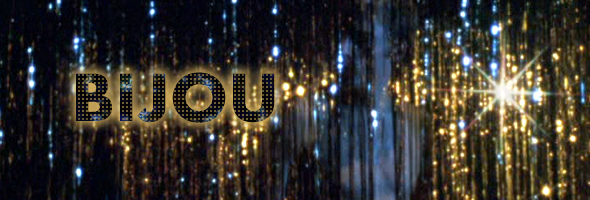

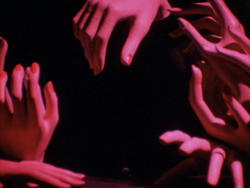 The explosion of porno chic in movie theaters across America was something few people probably
The explosion of porno chic in movie theaters across America was something few people probably 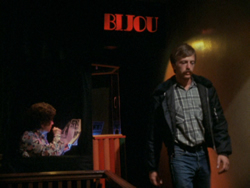 expected, but even fewer could anticipate the simultaneous legitimization of all-male films from the realm of underground loops to full features with prominent ads in national newspapers. One of the most important players in this breakthrough was Wakefield Poole, who channeled his Broadway theatrical experience into a small but revolutionary body of work. His first feature, Boys in the Sand, made a star out of Casey Donovan but isn't exactly an artistic masterpiece; however, you certainly can't say that about his second film, Bijou.
expected, but even fewer could anticipate the simultaneous legitimization of all-male films from the realm of underground loops to full features with prominent ads in national newspapers. One of the most important players in this breakthrough was Wakefield Poole, who channeled his Broadway theatrical experience into a small but revolutionary body of work. His first feature, Boys in the Sand, made a star out of Casey Donovan but isn't exactly an artistic masterpiece; however, you certainly can't say that about his second film, Bijou. 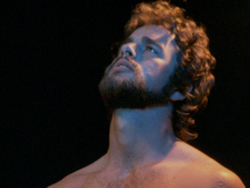 His mundane activity is intercut with a bald man driving nearby, while a woman approaches an intersection and ignores a traffic signal. When she's struck by the car, her purse goes flying to Harrison's feet, and he covertly slips it into his denim jacket. Back home in his tiny, depressing apartment, he's fascinated by the contents including a tube of lipstick and an invitation to a nearby theater called Bijou, with admission only at 7 p.m.
His mundane activity is intercut with a bald man driving nearby, while a woman approaches an intersection and ignores a traffic signal. When she's struck by the car, her purse goes flying to Harrison's feet, and he covertly slips it into his denim jacket. Back home in his tiny, depressing apartment, he's fascinated by the contents including a tube of lipstick and an invitation to a nearby theater called Bijou, with admission only at 7 p.m. 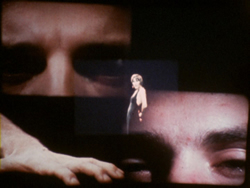 After taking care of himself in the shower, he decides to visit Bijou and, ushered through by a disinterested ticket taker, finds himself in a phantasmagorical world of lust and experimental films.
After taking care of himself in the shower, he decides to visit Bijou and, ushered through by a disinterested ticket taker, finds himself in a phantasmagorical world of lust and experimental films. 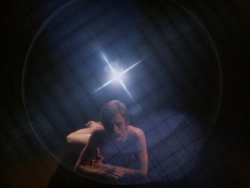 The Wakefield Poole Collection, taken from a grungy master probably dating back to the early VHS era. The new HD transfer found in Vinegar Syndrome's 2014 release is a massive improvement in every respect, with vivid colors that seem to blaze off the screen. It's hard to believe some of the miracles filmmakers could achieve with 16mm at the time, and along with the films of Henry Paris, this is one of the most impressive examples. Poole is present throughout this disc, refusing to offer a concrete explanation for the film's meaning and instead stating numerous times that viewers have to create part of the experience in their own heads. He's present for both a new video intro, an audio commentary, and a vintage appearance on the cable access show Emerald City (sitting with Donovan), all of which piece together the story of this film. Most interestingly, he goes into depth about shooting all of the main bijou interiors in Donovan's empty apartment, using theatrical trickery to turn it into a dark, cavernous realm of the subconscious. He also talks about poor Harrison having to do his shower scene in freezing water, some continuity gaffes, the granddaughter of one cast member approaching him at an Anthology Film Archives screening, some improvisation during the climactic scene, and the artistic influence for the film's striking fluorescent lights ("Remove Shoes"). Perhaps the most amusing extra is a bonus four-minute segment in which Poole talks about screening the film for a notable psychology professor and his entire family... on Easter Sunday. Finally the disc rounds out with 14 minutes of unused audition footage of five anonymous actors (intended for the experimental projected film) and the theatrical trailer. The same package (extras included) is also available as part of a limited three-disc Wakefield Poole Blu-ray set from Gorilla Factory.
The Wakefield Poole Collection, taken from a grungy master probably dating back to the early VHS era. The new HD transfer found in Vinegar Syndrome's 2014 release is a massive improvement in every respect, with vivid colors that seem to blaze off the screen. It's hard to believe some of the miracles filmmakers could achieve with 16mm at the time, and along with the films of Henry Paris, this is one of the most impressive examples. Poole is present throughout this disc, refusing to offer a concrete explanation for the film's meaning and instead stating numerous times that viewers have to create part of the experience in their own heads. He's present for both a new video intro, an audio commentary, and a vintage appearance on the cable access show Emerald City (sitting with Donovan), all of which piece together the story of this film. Most interestingly, he goes into depth about shooting all of the main bijou interiors in Donovan's empty apartment, using theatrical trickery to turn it into a dark, cavernous realm of the subconscious. He also talks about poor Harrison having to do his shower scene in freezing water, some continuity gaffes, the granddaughter of one cast member approaching him at an Anthology Film Archives screening, some improvisation during the climactic scene, and the artistic influence for the film's striking fluorescent lights ("Remove Shoes"). Perhaps the most amusing extra is a bonus four-minute segment in which Poole talks about screening the film for a notable psychology professor and his entire family... on Easter Sunday. Finally the disc rounds out with 14 minutes of unused audition footage of five anonymous actors (intended for the experimental projected film) and the theatrical trailer. The same package (extras included) is also available as part of a limited three-disc Wakefield Poole Blu-ray set from Gorilla Factory.